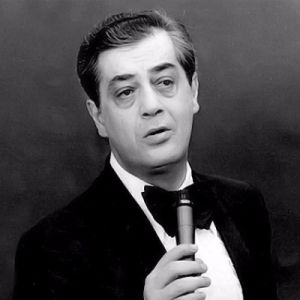Lúcio Alves (January 28, 1927 - August 3, 1993 ), was a Brazilian singer , guitarist and composer . He was a musician much appreciated by the heads of the bossa nova movement including Tom Jobim and João Gilberto who praised his vocal qualities and harmonic arrangements.

Lúcio Ciriblli Alves was a great interpreter of Brazilian music. Tom Jobim said he is "a formidable singer, he deserved the highest popular acclamation, but paid the price of being an artist ahead of his time." João Gilberto was a declared fan of his singing interpretation and his vocal and harmonic arrangements and Alves made some arrangements for Gilberto's Garotos da Lua and Gilberto lived with him at Raul Pompéia street in Rio. When Chega de Saudade was released, the first person to whom Gilberto showed the album was Alves.
Alves always had music as part of his family life: his father was the conductor of his city's band and a tuba player, his mother and aunt played the piano, his sister violin, and his brother’s guitar and flute. As early as six years old, Alves began to take acoustic guitar classes. At nine, already living with his family in Rio, he appeared at Barbosa Júnior's Bombonzinho radio show singing "Juramento Falso", a song turned extremely popular by Orlando Silva.
Whilst at the radio show he became acquainted with Carmen Miranda, Garoto, Os Quatro Diabos, O Bando da Lua, Carlos Galhardo, Chico Alves, and Ciro Monteiro, among others. He also appeared, in 1937, on Rádio Nacional's soap opera Aladim e a Lâmpada Maravilhosa, playing Aladin, and on the show Ora Bolas! In fact, as a prodigy child, he appeared on all children's shows.
In 1941, having broken a leg in a soccer play ("pelada"), he had to rest at home. As the only activity he could engage in was to sing, he formed the group Namorados da Lua, in which he was the crooner, violonista, and arranger. The group scored first place at Ary Barroso's show on January 12, 1941. In that year, Alves also won the Carnaval contest at the Teatro República, Rio.
The Namorados da Lua recorded their first 78 rpm album on October 15, 1942, with "Vestidinho de Iaiá" and "Té Logo, Sinhá" (both by Assis Valente), through Victor. The group would last for six years and several different formations, working at distinguished spots such as Cassino Atlântico and Cassino Copacabana, besides Rádio Nacional before disbanding in January 1948, when Alves left for a solo career.
In 1948, after a few recordings including Solidão , Aquelas palavras and Seja feliz ... adeus , he toured Cuba, Mexico and the United States together with the new group Anjos do Inferno. He was invited by Carmen Miranda to work with her, but he preferred to return to his homeland also refusing to collaborate with the Tex Beneke orchestra.
In the early 1950s, Alves began to record records in succession. In 1954 he joined the singer Dick Farney making a successful duo. Then he began composing bossa nova, alternating with recordings and the creation of new songs, performances in the theatre, clubs, on radio and television shows; and in turn he made the compositions of other artists his own, recording them in the studio; among these recordings an album that included hits like Rio, Ah! Se eu pudesse and O barquinho , all three composed by Roberto Menescal and Ronaldo Bôscoli .
In 1960 he released the album "Lúcio Alves Interpreta Dolores Duran", in honour of the singer and songwriter who died the previous year. In the 1960s, he recorded several bossa nova albums, such as "A Bossa É Nossa" and "Balançamba". From this bossa nova phase, his interpretations stand out for "Dindi", "O Samba da Minha Terra" , "Ah, Se Eu Pudesse" and "O Barquinho".
During most of the 1970s, he worked as a music producer on television stations, recording sporadically. His last recording was an album recorded live at the bar-restaurant Inverno & Verão - São Paulo - August 1986.
Little remembered and with financial problems he died from a heart attack in Rio de Janeiro, August 3, 1993 at the age of 66 years old. (Edited from Wikipedia & AllMusic)







